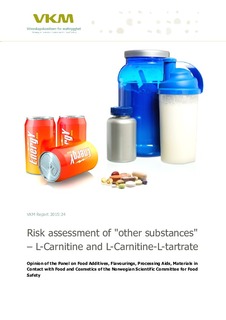Risk assessment of "other substances" – L-Carnitine and L-Carnitine-L-tartrate. Opinion of the Panel on Food Additives, Flavourings, Processing Aids, Materials in Contact with Food and Cosmetics of the Norwegian Scientific Committee for Food Safety
Bruzell, Ellen Merete; Granum, Berit; Hetland, Ragna Bogen; Husøy, Trine; Rohloff, Jens; Wicklund, Trude; Steffensen, Inger-Lise
Research report
Published version
Permanent lenke
http://hdl.handle.net/11250/2461127Utgivelsesdato
2015Metadata
Vis full innførselSamlinger
- Institutt for biologi [2575]
- Publikasjoner fra CRIStin - NTNU [38127]
Sammendrag
The Norwegian Scientific Committee for Food Safety (VKM) has, at the request of the Norwegian Food Safety Authority (NFSA), assessed the risk of 1500 mg/day of L-carnitine and 2250 mg/day of L-carnitine-L-tartrate in food supplements. L-carnitine occurs naturally in foods and is endogenously synthesised. L-carnitine-L-tartrate is synthesised commercially, and it dissociates into L-carnitine and tartaric acid in the gastrointestinal tract.
Based on the included literature there was no evidence indicating that age affects sensitivity towards L-carnitine, L-carnitine-L-tartrate or tartaric acid. Therefore, in this risk characterisation the same tolerance level as for adults was assumed for children and adolescents (adjusted for body weight).
VKM concludes that a dose of 1500 mg of L-carnitine per day, which is equivalent to a dose of 2250 mg of L-carnitine-L-tartrate per day, is unlikely to cause adverse health effects in adolescents (14 to <18 years), whereas intake at this level in children (10 to < 14 years) may represent a risk of adverse health effects. The tartaric acid exposure from this dose of L-carnitine-L-tartrate is unlikely to cause adverse health effects.
